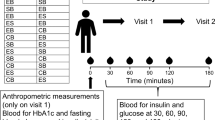Abstract
Phenylketonuria (PKU) therapy demands phenylalanine (Phe) calculation. In most countries, almost all food is taken into account, even fruits and vegetables. We investigated whether unrestricted consumption of fruits and vegetables negatively influences metabolic control. Nineteen PKU children (2–10 years) started with 2 weeks of free or restricted fruit and vegetable intake. After 2 weeks, the regime changed from free to restricted or restricted to free (cross-over design). Over the first 4 weeks, dried blood Phe concentration was measured, fruit and vegetable consumption recorded and nutrient intake calculated from diet records. Thereafter the diet was changed to free use of fruits and vegetables for all patients. Six and 12 months later, diet and Phe concentrations were monitored. Median Phe intake increased significantly by 65 mg/day (week 4, P<0.001), 68 mg/day (month 6, P<0.001) and 70 mg/day (month 12, P<0.001). Dried blood Phe concentrations remained stable (P=0.894), as did the frequency of Phe concentrations above the recommended range (P=0.592). In conclusion, PKU diet liberalization for fruits and vegetables seems unproblematic.
This is a preview of subscription content, access via your institution
Access options
Subscribe to this journal
Receive 12 print issues and online access
$259.00 per year
only $21.58 per issue
Buy this article
- Purchase on Springer Link
- Instant access to full article PDF
Prices may be subject to local taxes which are calculated during checkout

Similar content being viewed by others
References
Scriver CR, Kaufmann S, Eisensmith RC, Woo SL . The hyperphenylalaninemias Scriver RC, ed The Metabolic and Molecular Basis of Inherited Disease 7th edn 1998: McGraw-Hill: New York. pp 1015–1075.
Burgard P, Bremer HJ, Buhrdel P, Clemens PC, Monch E, Przyrembel H et al. Rationale for the German recommendations for phenylalanine level control in phenylketonuria 1997. Eur J Pediatr 1999; 158: 46–54.
MacDonald A, Gokmen-Ozel H, van RM, Burgard P . The reality of dietary compliance in the management of phenylketonuria. J Inherit Metab Dis 2010; 33: 665–670.
MacDonald A, Rylance G, Davies P, Asplin D, Hall SK, Booth IW . Free use of fruits and vegetables in phenylketonuria. J Inherit Metab Dis 2003; 26: 327–338.
Rohde C, Mutze U, Weigel JF, Ceglarek U, Thiery J, Kiess W et al. Unrestricted consumption of fruits and vegetables in phenylketonuria: no major impact on metabolic control. Eur J Clin Nutr 2012; 66: 633–638.
Ceglarek U, Muller P, Stach B, Buhrdel P, Thiery J, Kiess W . Validation of the phenylalanine/tyrosine ratio determined by tandem mass spectrometry: sensitive newborn screening for phenylketonuria. Clin Chem Lab Med 2002; 40: 693–697.
Hartmann B Bundeslebensmittelschluessel. 2009, Available at http://www.bls.nvs2.de/index.php?id=37, Max-Rubner-Institut.
Kersting M, Alexy U . OptimiX – Empfehlungen für die Ernährung von Kindern und Jugendlichen (German) 2005: aid Infodienst: Bonn.
Eggum BO . The influence of dietary fibre on protein digestion and utilization in monogastrics. Arch Tierernahr 1995; 48: 89–95.
Zimmermann M, Jacobs P, Fingerhut R, Torresani T, Thony B, Blau N et al. Positive effect of a simplified diet on blood phenylalanine control in different phenylketonuria variants, characterized by newborn BH4 loading test and PAH analysis. Mol Genet Metab 2012; 106: 264–268.
Acknowledgements
We thank the patients and their parents for their participation and daily efforts to meet the protocol requirements. The unrestricted financial support by MetaX, Institut für Diätetik, is greatly appreciated. Dr Gelbrich provided valuable advice concerning biometry and statistical analysis.
Author information
Authors and Affiliations
Corresponding author
Ethics declarations
Competing interests
The authors declare no conflict of interest.
Additional information
Author contributions
The trial was designed and submitted to authorities by SB and CR, with substantial consultation by WK and UC; patients were recruited and examined, and samples taken by SB, UM and MA; blood samples were analyzed by UC and JT; diet records were analyzed by CR; data management was maintained by CR and SB; statistical analyses were performed by CR; results were discussed and conclusions drawn by all contributing authors, especially ASM, AGT and UM; CR and SB drafted the manuscript and incorporated comments by all co-authors.
Rights and permissions
About this article
Cite this article
Rohde, C., Mütze, U., Schulz, S. et al. Unrestricted fruits and vegetables in the PKU diet: a 1-year follow-up. Eur J Clin Nutr 68, 401–403 (2014). https://doi.org/10.1038/ejcn.2013.272
Received:
Revised:
Accepted:
Published:
Issue Date:
DOI: https://doi.org/10.1038/ejcn.2013.272
Keywords
This article is cited by
-
The complete European guidelines on phenylketonuria: diagnosis and treatment
Orphanet Journal of Rare Diseases (2017)



